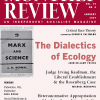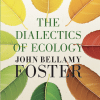
The U.S. Quest for Nuclear Primacy: The Counterforce Doctrine and the Ideology of Moral Asymmetry
John Bellamy Foster discusses the past and present state of U.S. nuclear policy, asserting that its reliance on belligerent approaches endangers the entire world. “Only a minimalist, as opposed to a maximalist, approach to nuclear arms can put humanity on the road to nuclear disarmament,” he writes, concluding that “the answer lies in a worldwide shift away from dying capitalism to…complete socialism.” | more…

Marx and Engels as Polyglots
Drawing on writings, historical accounts, and personal letters, Kaan Kangal surveys the considerable extent of Marx and Engels’s interest in language and capabilities as polyglots. This interest, he argues, was part and parcel of their political commitment to building worldwide socialism. | more…

The Case for Socialist Veganism
There is a paradox, Benjamin Selwyn and Charis Davis write, at the heart of corporate veganism in the Global North. While vegan products are sold to consumers as environmentally conscious alternatives to meat and dairy, the world’s largest producers of such products are rapacious, ecologically destructive, and exploitive of populations in the Global South. The authors argue that a turn toward socialist veganism can advance the goals of decommodifying and democratizing our food system. | more…

What matters now
A new poem by Marge Piercy. | more…

The Senegal Delta and Global Capitalism
As Pietro Daniel Omodeo observes in this review, “environmental politics cannot be separated from political decision-making.” Using the example of the Senegal delta, as explored in Maura Benegiamo’s La terra dentro il capitale, Omodeo shows that the neocolonial “Great Expropriation of the global commons” is underway in the Global South, with grim ecological and social consequences for those living in the delta. | more…

To Struggle!: A Review of Marcello Musto’s ‘The Last Years of Karl Marx’
Mauricio Betancourt reviews Marcello Musto’s The Last Years of Karl Marx. In the book, Betancourt finds a detailed portrait of Marx’s rarely examined later years, revealing a man who, despite personal tragedy and failing health, remained a vigorous intellectual and scholar through the end of his life. | more…

January 2024 (Volume 75, Number 8)
At the time of writing in late November 2023, Israel has continued its merciless assault on Gaza, which has killed tens of thousands at horrifying rates, as it also condones Israeli settler terrorism against Palestinians living in the West Bank. | more…

The Dialectics of Ecology: An Introduction
In this introduction to his forthcoming The Dialectics of Ecology (Monthly Review Press, 2024), John Bellamy Foster charts the relatively recent reconstruction of Marxian ecology, based on the classical Marxist understanding of the social-metabolic system linking humanity and nature. It is through dialectical naturalism, he writes, that we can face the crises of the Anthropocene while building a society that truly supports the well-being both of society and Earth itself. | more…

Judge Irving Kaufman, the Liberal Establishment, and the Rosenberg Case
Michael Meeropol, son of Julius and Ethel Rosenberg, examines a recent biography of Irving R. Kaufman, the judge who sentenced the Rosenbergs to death. Using his own deep research into his parents’ case, Meeropol shows how Kaufman’s virulent anti-Communism led him to put his thumb on the scales of justice, despite the later progressive liberalism for which he is often lauded. This in turn reveals a key contradiction: “Liberal democracy is fine as long as the basis of the system is not threatened. When it is…’dangerous’ people—Communists and other leftists—are dealt with by any means necessary.” | more…

Hegemonic Femininity in Popular Culture: Heteronormative Appropriation of Lesbian Sexualities in Contemporary India through Neeraj Ghaywan’s ‘Geeli Pucchi’
Using the lens of Neeraj Ghaywan’s film Geeli Pucchi, Aratrika Bose, Tanupriya, and Anuja Singh explore the ways in which lesbian characters negotiate the trappings of hegemonic femininity embedded in Indian culture, from marriage and home life to the workplace, and the role of the body and “beauty” in the navigation of feminine identities. | more…

Critical Race Theory
A new poem by Kenneth Salzmann. | more…

Palestine, Oh, Palestine!
In this review of Linda Dittmar’s Tracing Homelands, Paul Buhle writes, “History may yet hold hope when hope is otherwise lacking when we reject the stalemate that only leads to despair.” | more…

Social Medicine and Collective Health
Oscar Feo Istúriz reviews Social Medicine and the Coming Transformation, an extensive work that explores the concept of collective health, from its early basis in classical Marxism to its contemporary implementation in Latin America (and lack thereof in the United States). This model of social medicine-collective health has the potential to not only replace the dysfunctional model of public health under capitalism, but open up new pathways toward profound social transformation. | more…